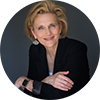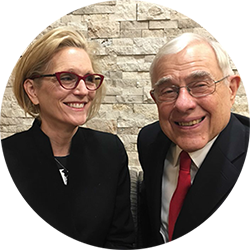Download PDF

An epiphany: We vacation like we work. My favorite vacation activity is skiing, and I hit the slopes just as the gondola opens with an intensity that hovers between anxiety and excitement. I ski hard all day, trying to keep up with 2 young adult sons. On most days I practice ophthalmology with this same fervor and happiness. I imagine that retirement also mirrors work life for many people; perhaps we retire the same way as we work.

Dr. Williams and her father-in-law, Dr. Gieser.
My father-in-law, Richard Gieser, recently retired after more than 40 years as a retina specialist. When he was still practicing in his mid-70s, he asked, “What do you think I’ll do in my retirement?” His answer: “I’m doing it.” At that point, he could do anything he wanted with his time, but he chose to continue practicing medicine because that was what he loved most. He shares some of his thoughts on the transition into retirement from “the best job on Earth.”
While every path is different, Dick suggests that retirement often happens gradually. First, an ophthalmologist might quit surgery or see fewer patients. For him, official retirement came when he withdrew from clinical practice, no longer seeing patients. However, he still teaches at residency programs in Sudan, Mongolia, China, and Egypt; reviews interesting cases on Thursday evenings with his retina colleagues; and maintains a rigorous discipline of reading ophthalmology journals.
After 41 years of ophthalmology practice, Steve Litinsky will retire this year. He is looking forward to slowing down, but he still wants to contribute to the profession that gave him such a great career. He plans to volunteer at a community clinic for uninsured patients and continue in his role as a trustee at the hospital.
Greg Kwasny, who suggested the topic of retirement in an EyeNet Letter to the Editor, transitioned by selling his practice and moving closer to his kids. He then worked part time as a medical ophthalmologist but abruptly retired after a retinal detachment that required multiple surgical repairs resulted in vision loss. He describes himself as a “recovering ophthalmologist.” Fortunately, he discovered woodworking and now channels his skills into that creative pursuit. Steve plays more golf and bridge. Meanwhile, Dick notes that his long-planned organization and home projects still don’t get done.
In an essay in JAMA, Lawrence Hergott, a cardiologist at University of Colorado School of Medicine, reflects on his own retirement. He lists the many things he will miss: the friendship and support of colleagues, hallway conversations with coworkers, trenchant medical humor, analyzing imaging studies, reassuring patients, curing some patients and journeying with some who can’t be cured, and the “never-ending fascination that accompanies medical practice.”1
The silver lining, all 3 ophthalmologists noted, is their relief from the authority of schedules and the nuisance of regulation. Steve happily predicts, “I won’t have to deal with insurance and government red tape that has made practice less enjoyable over the last several years.” Despite these daily stresses of practicing medicine, ophthalmologists overall are less burned out and happier than most physicians. The 2017 Medscape Lifestyle Report listed ophthalmology near the top of the happiness chart (only urology was higher).2 Perhaps this is one reason people miss their work so much and continue practicing in some fashion even after official retirement.
My father-in-law supports the idea that we retire (or vacation) the same way as we live. He said, “The factors that create a happy retirement are the same factors that create a happy life before retirement—keeping intellectually and physically active, focusing on serving others, and always being grateful.”
___________________________
1 Hergott LJ. JAMA. 2017;317(2):137-138.
2 www.medscape.com/features/slideshow/lifestyle/2017/overview#page=18.